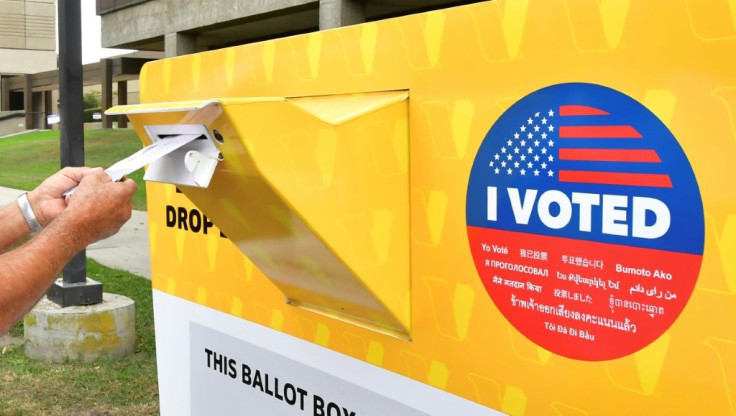Nov. 3 Ballots: Health, Slavery, Abortion

Laws govern many issues concerning health. They regulate how a doctor practices medicine -- or whether marijuana is a medical treatment, a recreational treat or a crime.
This November, US voters have the chance to create several new health laws, as they cast election ballots on important ballot initiatives in their states. (A ballot initiative, also called a measure or proposition, asks voters’ approval to enact or repeal a law or amend the state constitution.)
Voters in various states will decide whether to legalize marijuana and magic mushrooms, who can get family leave, restrictions on abortions, sex education and stem cell research. Two states, Nebraska and Utah, ask voters whether to eliminate slavery as a form of punishment.
For information on your home state, the National Conference of State Legislatures runs a searchable ballot measures data base.
Going up in Smoke
Eleven states already allow the recreational use of marijuana. This November, five more are considering the question.
Arizona, which voted no on recreational marijuana in 2016, is voting again this fall. New Jersey made an effort in 2017 that failed and is trying again. Some experts think that passing legalization in New Jersey could have a domino effect on its geographical neighbors, Pennsylvania and New York. Medical marijuana is already legal in both the Keystone and the Empire states.
Other states voting on recreational use are Montana, Mississippi and South Dakota.
One step further
Oregon is voting on the therapeutic use of psilocybin mushrooms, also called magic mushrooms, a group of fungi that contain the hallucinogen psilocybin. Measure 109, or the Psilocybin Program Initiative, proposes allowing the Oregon Health Authority to permit licensed providers to administer psilocybin-related products to persons 21 and older.
Who stays home?
Colorado voters will vote on Proposition 118, which would allow for 12 weeks of paid family leave to care for a sick relative or new baby, or to recover from a serious injury. Eight other states already offer parents and caregivers paid time to take care of their families: California, New Jersey, Rhode Island, New York, Washington, Massachusetts, Connecticut and Oregon, as well as the District of Columbia. But this is the first time family leave has been left to the voters; the other states and DC passed family leave laws.
Long Time Coming
Nebraska is moving to strike problematic language from its state constitution, with Amendment 1. The constitution prohibits slavery but allows it as punishment for a crime.
"Slavery is not a Nebraska value and we need to get rid of it. It’s 2020; it’s time to update our Constitution,” Melina Cohen, an activist in a group pushing for Amendment 1, told the local news.
Nebraska is not alone. Utah has a similar ballot initiative, Amendment C, to remove slavery as punishment for a crime. Utah also asks voters’ permission to remove gendered language from the constitution, for example, changing man or men to person or people.
Abortion
Always a subject of hot debate, abortion is being directly voted on in Colorado (Prop. 115) and Louisiana (Amendment 1). The Colorado proposition would ban all abortions after 22 weeks of gestation.
According to the Guttmacher Institute, which researches policy around abortion, “Most often, courts have voided state restrictions [on 22 week abortion] because their terms are ambiguous or overly broad, they contain an unacceptably narrow health exception or none at all, or they rely on a rigid definition of fetal viability based on gestation or trimester.”
Louisiana proposes to block all state funding of abortion. Amendment 1 states, “[T]o protect human life, a right to abortion and the funding of abortion shall not be found in the Louisiana Constitution.”
Safe Sex for Everyone
Some states are putting forward laws around health and health information. A ballot initiative in Washington proposes comprehensive sexuality education for public school students. Washington passed such a law in March, but voters now need to affirm the legislation or strike it.
Happy Healthy People
Californians will vote on two health measures this fall. The first would require a physician to be present at all hours at a dialysis center, which provides healthcare for people with failing kidneys. According to CalMatters, 80,000 people in California use dialysis services. Proponents say that this would make dialysis safer. Opponents say that this is an unnecessary step that would make clinics more expensive and possibly cause some to close.
Californians will also be voting on Proposition 14, which would allow the state to borrow up to $5.5 billion dollars for stem cell research.
To Vote or Not to Vote
Voting isn’t just about picking politicians. It is also about setting laws. When ballot measures, propositions or amendments are on the table, each vote cast by a state resident counts.
Sabrina Emms is a science journalist. She got her start as an intern at a health and science podcast out of Philadelphia public radio. Before that she worked as a researcher, looking at the way bones are formed. When out of the lab and away from her computer, she's moonlighted as a pig vet's assistant and a bagel baker.
Published by Medicaldaily.com



























